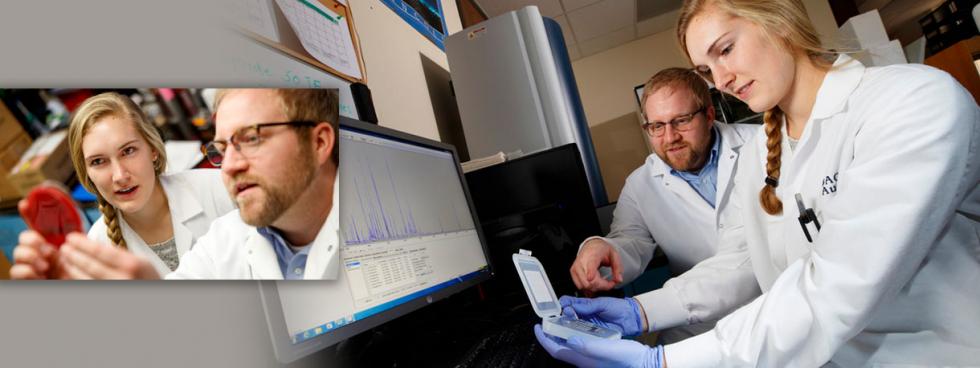
Standing Up to Superbugs
A day job isn’t enough for Dr. Dustin Loy.
By day Loy (’09 and PhD ’11) is an associate professor in the University of Nebraska-Lincoln’s School of Veterinary Medicine and Biomedical Sciences. There he is the lead instructor for the school’s public health course and a co-instructor in pathogenic microbiology.
As a diagnostic microbiologist, Loy also assists veterinarians and their clients and livestock producers in the diagnosis, detection and prevention of infectious disease.
“Having the opportunity to mentor students and future veterinarians is one of my passions,” Loy said. “The service we provide in the diagnostic center allows me to keep in touch with veterinary colleagues, help them with infectious disease challenges and solve complex problems.”
His work has led to his selection for the Iowa State University Alumni Association’s Outstanding Young Alumni Award. Loy was one of two alumni selected this year for this award.
What he does outside of his job is just as impressive. For the past few years, Loy has served as an ambassador for the Pew Trust’s “Stand Up to Superbugs.” This diverse group of individuals work to combat antibiotic-resistant bacteria and prevent a return to the pre-antibiotic era when simple infections accounted for at least one-third of the country’s deaths.
It’s a program Loy believes deeply in.
“To me, the ‘Stand Up to Superbugs’ movement is about working to come up with One Health solutions to One Health problems,” Loy said. “Antimicrobial resistance effects not only humans but animals, and involves the environment, wildlife, anywhere there is microbial life.”
Loy credits his Iowa State education in gaining a strong background in disease prevention and management strategies. He says those tools and more will be needed to prevent new and emerging diseases and resistant pathogens.
These are just a few of the points Loy speaks on when he meets with federal officials as a “Stand Up to Superbugs” ambassador. He is careful to point out the issue is very broad.
“We are able to communicate potential solutions to the antimicrobial resistance problem revolve around not just new drug development and are not immediately apparent,” he said.
The issues include research in disease prevention, getting rural producers access to veterinarians and information delivery through outreach and extension.
Challenges and opportunities such as this are what got Loy interested in his field of study in the first place. As an Iowa State undergraduate student, Loy was primarily interested in animal agriculture with a goal of becoming a large animal veterinarian.
Then he became an undergraduate research assistant in the College of Agriculture and Life Sciences. There he began learning animal molecular genetics which ultimately led to veterinary microbiology.
“I was captivated by the power of these molecular tools to be able to map genes and find a single mutation in the genome that could have such a tremendous impact on animals,” Loy said. “When I first started you had to grow bacteria in tubes and look for biochemical reactions. We now use methods borrowed from the chemistry lab like mass spectrometry.
“These new challenges and opportunities make this area incredibly exciting with new findings every day and new approaches to master.”
October 2021
